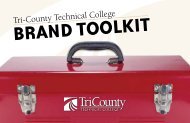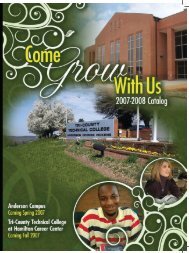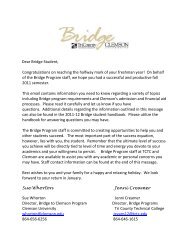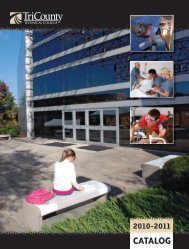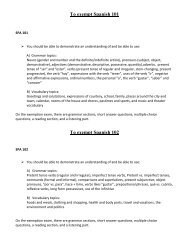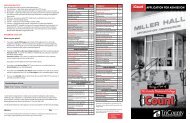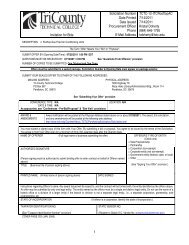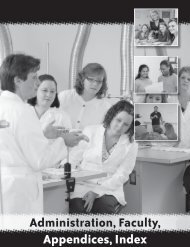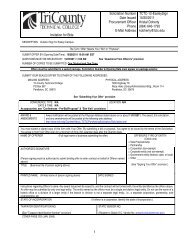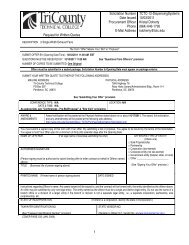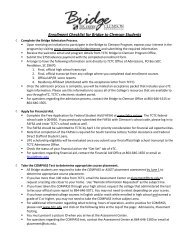TCTC Catalog - Tri-County Technical College
TCTC Catalog - Tri-County Technical College
TCTC Catalog - Tri-County Technical College
Create successful ePaper yourself
Turn your PDF publications into a flip-book with our unique Google optimized e-Paper software.
ADMINISTRATION/<br />
FACULTY<br />
APPENDICES<br />
& INDEX<br />
Appendices<br />
APPENDIX 4<br />
STUDENT CODE<br />
SOUTH CAROLINA TECHNICAL<br />
COLLEGES<br />
GENERAL PROVISIONS<br />
I. Principles<br />
<strong>Technical</strong> college students are members of both the community<br />
at large and the academic community. As members of the<br />
academic community, students are subject to the obligations<br />
which accrue to them by virtue of this membership. As members<br />
of the larger community of which the college is a part,<br />
students are entitled to all rights and protection accorded them<br />
by the laws of that community.<br />
By the same token, students are also subject to all laws, the<br />
enforcement of which is the responsibility of duly constituted<br />
authorities. When students violate laws, they may incur penalties<br />
prescribed by legal authorities. In such instance, college<br />
discipline will be initiated only when the presence of the student<br />
on campus will disrupt the educational process of the<br />
college. However, when a studentís violation of the law also<br />
adversely affects the collegeís pursuit of its recognized educational<br />
objectives, the college may enforce its own regulations.<br />
When students violate college regulations, they are subject to<br />
disciplinary action by the college whether or not their conduct<br />
violates the law. If a studentís behavior simultaneously violates<br />
both college regulations and the law, the college may take disciplinary<br />
action independent of that taken by legal authorities.<br />
The Student Code and Grievance Procedure for South Carolina<br />
<strong>Technical</strong> <strong>College</strong>s sets forth the rights and responsibilities<br />
of the individual student.<br />
II. Solutions of Problems<br />
The college will seek to solve problems by internal procedures<br />
of due process. When necessary, offcampus law enforcement<br />
and judicial authorities may be involved.<br />
In situations where South Carolina <strong>Technical</strong> <strong>College</strong>s have<br />
shared programs, the Chief Student Services Officer where the<br />
alleged violation of the Student Code for the South Carolina<br />
<strong>Technical</strong> <strong>College</strong> System occurred will handle the charges. A<br />
change of venue to the other college may be granted, based on<br />
the nature of the offense, provided it is agreed to by the Chief<br />
Student Services Officers of both colleges. Any sanctions imposed<br />
will apply across both colleges.<br />
In situations where a student is dually enrolled in 2 or more<br />
South Carolina <strong>Technical</strong> <strong>College</strong>s and is charged with a violation<br />
of the Student Code for the South Carolina <strong>Technical</strong> <strong>College</strong><br />
System, the Chief Student Services Officer of the college<br />
where the alleged infraction occurred will handle the charges<br />
and the sanctions may apply at each college in which the student<br />
is enrolled.<br />
III. Definitions<br />
When used in this document, unless the content requires<br />
other meaning,<br />
A. “<strong>College</strong>” means any college in the South Carolina <strong>Technical</strong><br />
<strong>College</strong> System.<br />
B. “President” means the chief executive officer of the college.<br />
C. “Administrative Officer” means anyone designated at the<br />
college as being on the administrative staff such as President,<br />
Vice President, Vice President for Student Affairs or Student<br />
Services, Chief Academic Officer, Dean of Instruction, or Business<br />
Manager.<br />
D. “Chief Student Services Officer” means the Administrative<br />
Officer at the <strong>College</strong> who has overall management responsibility<br />
for student services, or his/her designee.<br />
E. “Chief Instructional Officer” means the Administrative Officer<br />
at the <strong>College</strong> who has overall management responsibility<br />
for academicprograms and services, or his/her designee .<br />
F. “Student” means a person taking any course(s) offered by<br />
the college.<br />
G. “Instructor” means any person employed by the college to<br />
conduct classes.<br />
H. “Staff” means any person employed by the college for reasons<br />
other than conducting classes.<br />
I. “SGA” means Student Government Association of the college.<br />
J. “Campus” means any place where the college conducts or<br />
sponsors educational, public Service, or research activities.<br />
K. “Violation of Law” means a violation of a law of the United<br />
States or any law or ordinance of a state or political subdivision<br />
which has jurisdiction over the place in which the violation<br />
occurs.<br />
L. “Suspension” means a temporary separation of the college<br />
and student under specified conditions.<br />
M. “Expulsion” means permanent separation of the college and<br />
student.<br />
STUDENT CODE<br />
I. General Rights of Students<br />
A. Nondiscrimination<br />
There shall be no discrimination in any respect by the college<br />
against a student, or applicant for admission as a student, based<br />
on race, color, age, religion, national origin, sex or disability.<br />
B. Freedom of Speech and Assembly<br />
Students shall have the right to freedom of speech and assembly<br />
without prior restraints or censorship subject to clearly<br />
stated, reasonable, and nondiscriminatory rules and regulations<br />
regarding time, place, and manner.<br />
Students desiring to conduct an assembly must submit a request<br />
to the President, or other designated college official, requesting<br />
a specific date, time, location, and manner no later<br />
than 15 working days prior to the date of the desired event.<br />
The request will be approved, amended, or denied no more<br />
than 10 working days prior to the desired event.<br />
133



